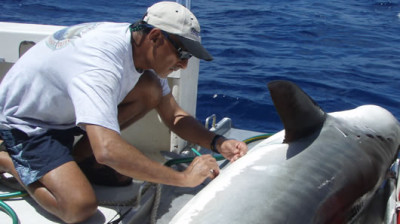NSU Newsroom
SharkBytes
Horizons
This version of NSU News has been archived as of February 28, 2019. To search through archived articles, visit nova.edu/search. To access the new version of NSU News, visit news.nova.edu.
This version of SharkBytes has been archived as of February 28, 2019. To search through archived articles, visit nova.edu/search. To access the new version of SharkBytes, visit sharkbytes.nova.edu.
NSU Research Spotlight: Shark Research
Mahmood Shivji, Ph.D., has made national and international news repeatedly for his revealing research disclosures about shark biology, the shark fin trade, and its impact on shark populations.
Shivji first developed an interest in the natural environment, and especially wildlife, in grade school.
Later, as a college junior, he lucked into a job helping a professor with his marine ecology research in British Columbia. The job involved lots of coldwater diving.
“We even dove in the winter when it was snowing, but it was fascinating research in a beautiful, wild environment,” Shivji remembers. “That experience led me to pursue graduate work in biology and become a researcher and university professor, and it has proven to be a great decision for me.”
As director of the Guy Harvey Research Institute and the U.S. Save Our Seas Shark Center, Shivji seeks to provide a fundamental understanding of how marine species work, that is to say, their biology and ecology. The applied goal of his research is to make practical and useful contributions to conserve species and improve the health of our deteriorating ocean ecosystems.
Shivji’s research focuses on sharks and rays; bony fish, such as marlins and groupers; and coral reef invertebrate animals, such as sponges and crustaceans. He uses a combination of approaches, such as lab-based genetics research and fieldwork, to get a holistic understanding of how animals function at individual and broader population levels.
Shivji considers his work not a job but an avocation, describing what he does as an “enormously gratifying way to earn a living.”
